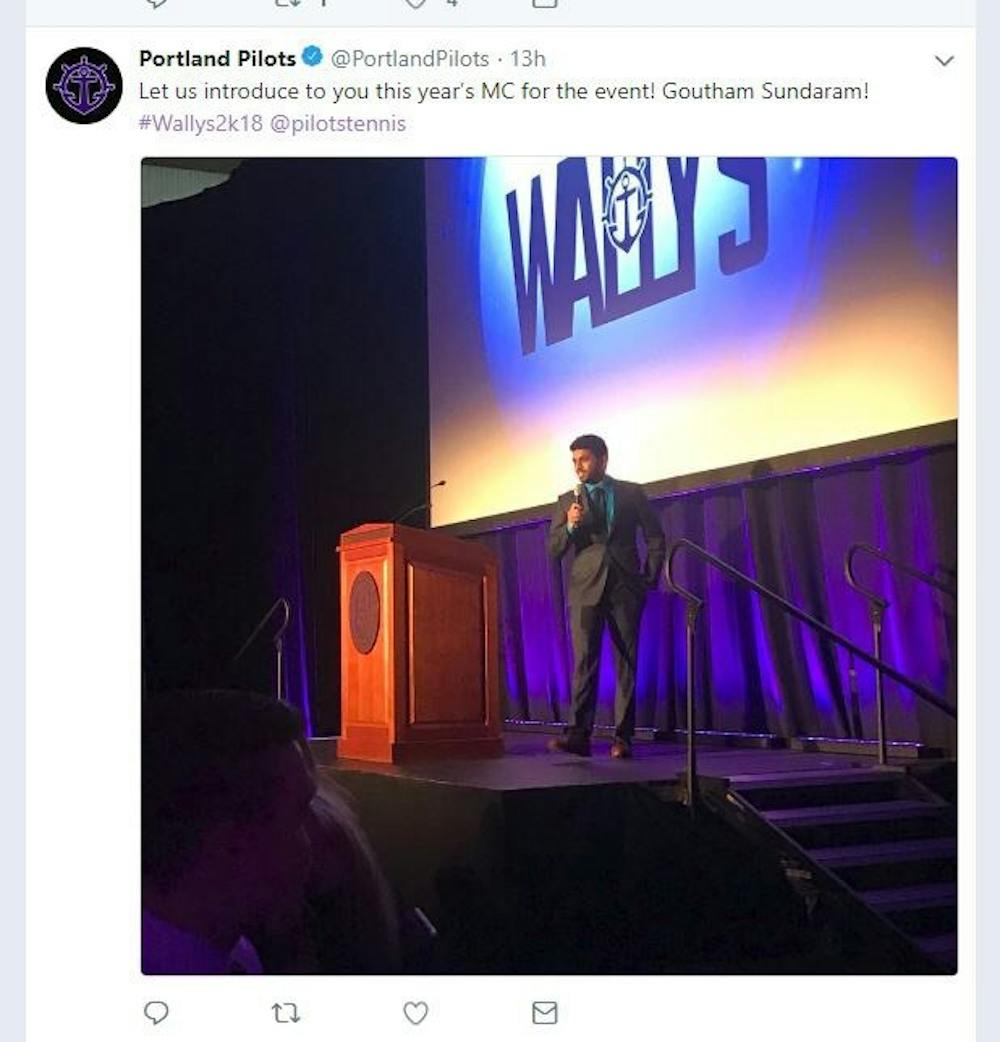My name is Olivia Sanchez, and I am a senior at the University of Portland. I have been a student-athlete on The Bluff for three years, and in less than three weeks, I will graduate with a bachelor’s degree in psychology. Last night, Sunday, April 15, I had the most disturbing experience of my time here during the Athletic Department’s fifth annual Wally Awards.
The event, normally an end-of-year awards banquet that celebrates the community within Athletics, was tainted by the violent, misogynistic speech of senior men’s tennis player Goutham Sundaram. Sundaram, the emcee, introduced himself with a speech in which he said he was going to open up, get real and “make the stage (his) locker room.”
Sundaram’s speech detailed his sexual pursuits during the last four years and explicitly stated that his main goal throughout college was not academic or even athletic, but sexual: to get white women to sleep with brown men.
Many student-athletes, including myself and several men’s basketball players, along with head basketball coach Terry Porter walked out of the event. University President Fr. Mark Poorman remained seated in the front of the room.
“Go brown and turn your frown upside down,” Sundaram said repeatedly.
Most of the audience laughed.
Sundaram continued on, explaining that his teammates have had more luck in engaging in sexual intercourse than he has. “Go French and your panties get drenched,” he said of his French teammates.
He weaved in the story of how his parents met in India, his father’s pursuit of his mother and their immigration to the United States. He suggested that his parents’ immigration would be worth it if he could “hook up with a white girl.”

It was after this comment that I could not physically handle to be in the room anymore. I quickly expressed my horror to my coach, Pasha Spencer, and left the room. Men’s basketball players Franklin Porter, Malcolm Porter and JoJo Walker also left the room. Former Trail Blazer Porter followed them.
I was standing in the hallway shaking when Walker came out of the gym. When I asked him why he left, he said what Sundaram was suggesting was not OK. I’m not a touchy-feely person, but in that moment I so wanted to want to give him a hug.
Spencer and Assistant Athletic Director of Compliance and Student Services Ryan McAlvey approached the stage from their table in the back of the room, and Sundaram was soon off the stage.
McAlvey and Spencer then both left the room.
The event was organized by the Student-Athlete Advisory Committee, or SAAC. Several SAAC members said he did not consult anyone before delivering this horrendous speech.
Sundaram repeatedly made sports innuendos, taking quick breaks from his violent speech to roast other sports teams, and eventually blamed his lack of sexual “success” on an “unfair referee,” or PSAFE shutting down parties before 11 p.m., suggesting that he was going out at night on the weekends to parties looking for girls to sleep with.
Several other athletes left the room after Sundaram said “Gandhi didn’t fast for twenty days so that I could get to America and not sleep with white women.”
Men’s tennis head coach Aaron Gross got behind the podium later in the evening to apologize for his athlete, Sundaram, and said that Sundaram’s comments did not reflect the views of the tennis team. Multiple other athletes reported that Gross said “I love you Goutham, I love you, and I know that you tried your best, but that doesn’t reflect the views of the tennis team.”
After the opening speech, cross country coach Rob Conner was awarded “Coach of the Year”. As he came up on stage to accept his award, he had the opportunity to change the narrative. He could’ve condemned the violent words against women and the perpetuation of rape culture. What he did instead was keep the peace, stating more or less to anyone who might have been offended that evening, “let’s move on and have a good time.”
While it was wonderful that he could move on and have a good time, I, as a woman, could not.
Tonight, I had two options. I could stand by and listen to Sundaram perpetuate rape culture and violence against women, or I could stand up and walk out, and risk coming off as a “crazy lady” who “can’t take a joke.”
I felt trapped. This event was mandatory. I had friends who were being honored. I have woken up at 5:00 in the morning nearly every day of my college career. I have pushed myself physically, mentally and emotionally to achieve success. This night was supposed to be about me. About all of us.
Instead, it was a “locker room”: one that I was excluded from since I couldn’t get the joke. The “joke” was never meant for me.
Sundaram’s words were actively marginalizing all the women who have worked hard all year for this. And Conner and Gross let it happen, deepening the divides. It’s been a long road, paved with Title IX regulations and sexism, to create a place for women in athletics. And tonight proved that that place is not even promised to feel safe. They might let us in the room, but they don’t have to acknowledge that we’re there and that maybe we don’t need to hear about how as women, we owe an immigrant sex, because Gandhi starved for that very purpose.
Forget being an athlete for a moment. As a student at the University of Portland, and as a journalist compelled to hold power to account, I am deeply disappointed in our university president, our senior associate athletic director and senior woman administrator.
They sat in the front row. And did nothing.
This is what we talk about when we say “bystander.” This is what we don’t mean, when we talk about being a “green dot.” Sundaram may not have been physically violating someone, but I felt violated. I felt unsafe. I was physically shaking. And what made it worse was that our top leaders of this campus, not to mention Sundaram’s teammates (the tennis team laughed the whole time), couldn’t understand the magnitude of the violence and harm that those words reverberate. Inaction and silence are equal acts of violence.
I do want to acknowledge rowing head coach Pasha Spencer, Porter, Women’s Head Basketball coach Cheryl Sorenson, and McAlvey, all four of whom got up from their table in the back of the room and approached the stage where Sundaram was still spouting off sexist jokes and objectifying sports innuendos in attempts to cut the speech short.
Other athletes reported that Sundaram seemed to return to his scripted duties upon the coaches’ intervention. These athletics leaders did what many others in positions of power should have done. But it all came too late.
I left. I walked home in the rain, my best dress drenched by the time I got home. This was my final Wallys, and I didn’t even make it to see any awards.
As news and managing editor of The Beacon, I am often cautious of putting my opinions out into the world. But this time, I can’t stay silent. We need to talk about this.
The fact that “locker room talk” seeped its way into a place where as a woman, I should have felt safe, should be a lesson for us all. Sundaram’s idea of locker room talk shouldn’t be acceptable in any locker room, let alone a public event honoring his peers. I understand that the Wallys can be a place for athletes to let loose and make jokes, but this is something different.
Whether you’re a white man or a man of color, women never owe you sex. No one owes you sex. Nobody died so you can have sex. Nobody starved so you can have sex. To belittle the work of others as a way of bolstering your own sexual entitlement is nauseating. The fact that I had to listen to it with little impediment though, was much much worse.
Our university formed an ad hoc committee to address Title IX and concerns about sexual assault on this campus. We are literally coming off the heels of a sexual assault awareness week put on by student advocates, in conjunction with National Sexual Assault Awareness Month. Across the country and around the world, women are challenging rape culture and bravely stepping forward with their #MeToo stories. Sitting in that room, I felt like all of the words about protecting the women on our campus from attack had washed away.
Athletics should never be an exception, particularly when a recent study demonstrated that of the 46 percent of participants who engaged in sexually coercive behaviors on campus, more than half were intercollegiate and recreational athletes.
We can’t allow this to be the culture of our Athletics Department. As I looked around at several of my fellow athletes laughing and doing nothing, I had never been more disappointed.
This piece is already too long, but just in case anyone is reading and scratching their head as to what about Sundaram’s words were violent and unacceptable, I want to take the time to break it down for you.
One, as I stated before, women never owe men sex. To imply that you deserve sex for any reason completely dehumanizes the body at the other end of that statement. Women are not vehicles for your sexual gratification, and when we spout this narrative, we normalize unwanted sexual attacks on women. Because if you’re owed something, your natural inclination is to take it, whether there is consent or not.
Two, the way in which Sundaram glorified “white women” as the ultimate prize was not only grossly sexist but bent towards a common racist culture of holding up white women as the standard, and women of color as second rung, even among men of color.
Lastly, my particular predicament is representative of a sexist culture we don’t talk enough about. After I walked out, I was told that people asked my friends what was wrong with me. Why was I so upset? As a woman, it’s hard to stand up, or simply remove yourself, from situations where you feel unsafe. You are pegged as dramatic or overreacting. You lose the label of “fun,” “easygoing,” “one of the guys” when you speak out or even fail to hide your dismay about this type of injustice.
I walked out last night and immediately started writing this piece. I am not silent, and for that, I will likely never be the “cool athlete girl who’s in on the joke.” But I never want another female athlete to feel objectified like that again. To feel her skin crawl and knees buckle on a night when her strength should be celebrated.
Sundaram, this night was about you, about the women you couldn’t conquer. But it shouldn’t have been. Your sexual struggles should never trump my safety.
This was abhorrent. Athletics can do better.








